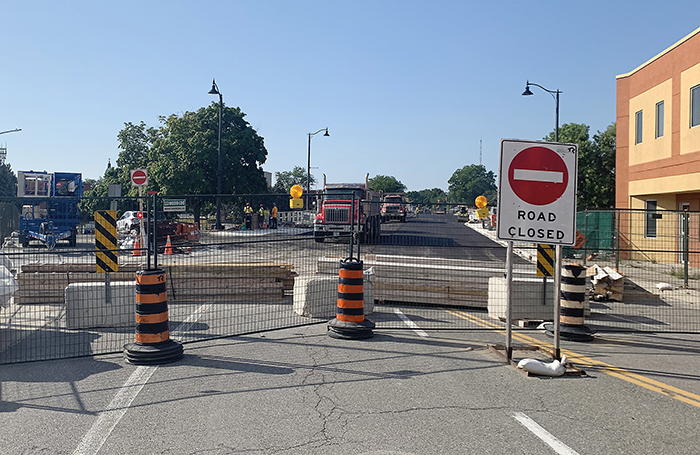
Chatham’s Third Street Bridge will miss yet another official re-opening date, this time due to missing railings.
Municipal officials said the delay is due to missing pedestrian safety railings that have not yet been delivered to the construction site.
The railings in question go along the outside edges of the bridge providing pedestrian and vehicular safety. These are also the railings that will contain the new LED light strips to shine onto the sidewalks.
Without these railings, the bridge will remain closed to the public due to safety concerns as the provincial Ministry of Labour will continue to consider the bridge as an active construction site.
Aldo Paganelli, president of Toronto Zenith Contracting Limited – the general contracting firm leading the bridge reconstruction – said the railings (one of the last remaining elements of the project) have not been completed by the firm contracted to fabricate the rail.
“This is very rare for this fabricator,” Paganelli said in a media release. “We work with trusted, professional companies. We are extremely disappointed and as president of Toronto Zenith, the responsibility ultimately lies with me. I apologize to the citizens of Chatham-Kent. We will make this situation right.”
Paganelli said his firm is still investigating the issue.
The Third Street Bridge was originally scheduled to be re-opened in December of last year. But that got pushed back to June. Additional delays pushed the re-opening back to Saturday, and that too has been pushed back.
Paganelli said he is not willing to guarantee a new completion date until more information is available on the missing railings.
Through it all, Chris Thibert, Chatham-Kent’s director, of engineering, said Toronto Zenith has been a model firm to work with.
Toronto Zenith wasn’t made aware of any issue with the railings until the delivery dates were not being met.
“The railings were supposed to be delivered to the site early last week at the latest and installed just in time for this event this Friday,” Thibert said. “They were committed to working diligently to get this done on time and open the bridge.”
Thibert said penalties associated with the non-completion of the project will begin this Friday.
“It’ is unfortunate that Toronto Zenith was let down in this fashion, but we have a responsibility to Chatham-Kent taxpayers to ensure that contracts are fulfilled,” he said.
Mayor Darrin Canniff said he is disappointed that the ribbon-cutting ceremony is delayed.
“Through supply chain issues caused by COVID, through unexpected labour disruptions and other issues, the project has continued,” he said. “We are going to have a beautiful bridge that will last decades. I’m sorry we have to wait a while to have it completed, but we don’t live in a perfect world.”
Meanwhile, Bridgerama, an event tailored to celebrate the bridge’s re-opening will still take place on Saturday. The mayor urged citizens to attend Bridgearama, which is being organized by the Historic Chatham Downtown BIA.
“The organizers have put a lot of work into the event and it will be well worth the visit. There is a lot to see downtown,” he said.
Bridgerama gets underway on Saturday, at 11 a.m. The event will feature entertainment, sales, arts and crafts, and stories through to 7 p.m.







We need to start handing out fines for not completing on time. We should have done it the first time I’m positive there wouldn’t have been a second. NO matter their excuse
With all due respect, both the general contractor and the municipality engineers should have their competence questioned. As a professional engineer in the 1980s, I was able to construct pipelines and crude oil transfer facilities in the NWT on time and on budget. 100% of my construction materials were barged (June-Sept) or driven up the ice road (Jan-March) from Alberta. Pre-planning and proactive purchasing ensured that 100% of the construction materials were on site when required. Daily monitoring by construction supervisors and weekly visits by me ensured that the contractors adhered to the agreed on schedule.
In my opinion, the city has seriously failed to scope the job, include time and cost contingencies, and monitor progress in a timely manner so that materials delivery and construction are both on schedule. Correction of short falls in any area should be identified and addressed before they impact delivery of the end product.
If this were an Imperial Oil project, the project engineers would be terminated and the non-performing contractors would never get onto a bid list again.